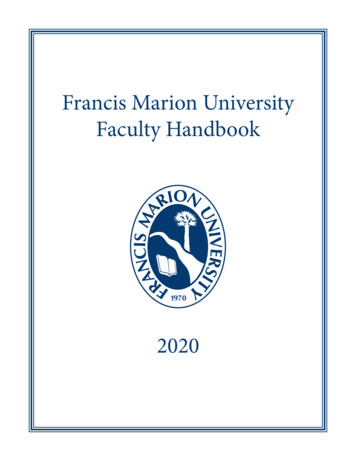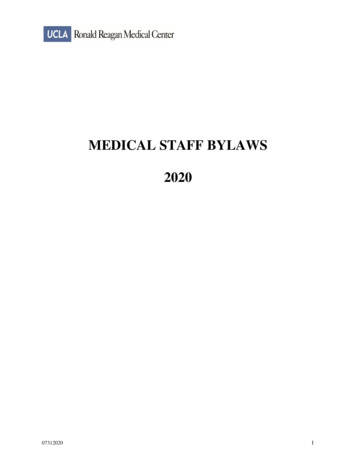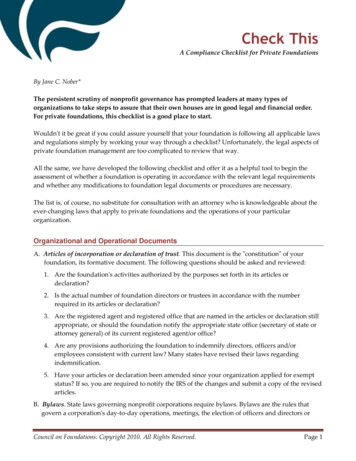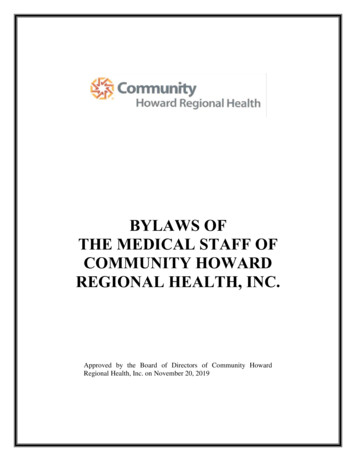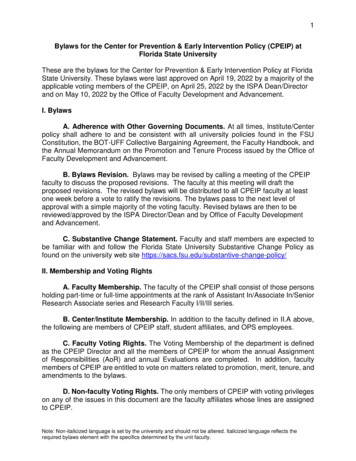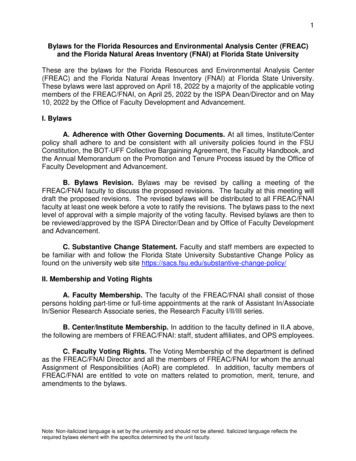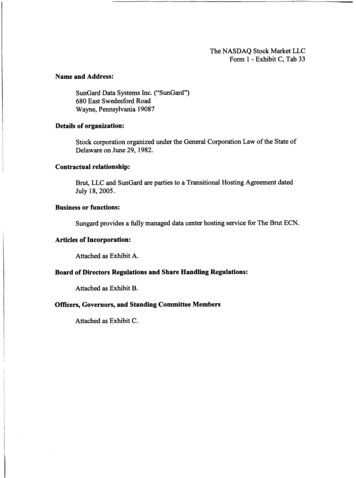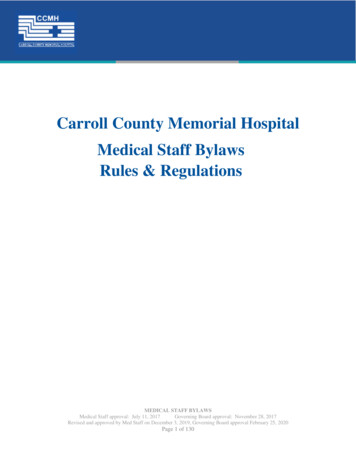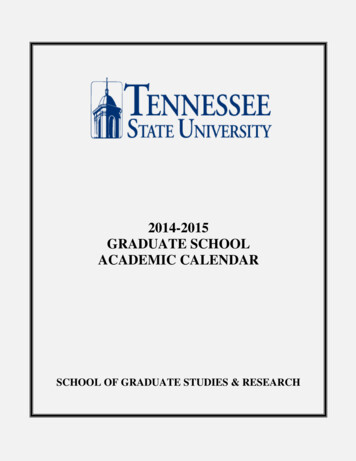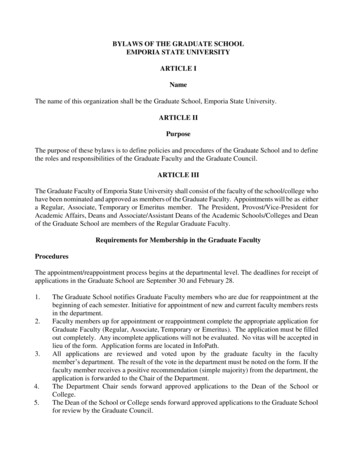
Transcription
BYLAWS OF THE GRADUATE SCHOOLEMPORIA STATE UNIVERSITYARTICLE INameThe name of this organization shall be the Graduate School, Emporia State University.ARTICLE IIPurposeThe purpose of these bylaws is to define policies and procedures of the Graduate School and to definethe roles and responsibilities of the Graduate Faculty and the Graduate Council.ARTICLE IIIThe Graduate Faculty of Emporia State University shall consist of the faculty of the school/college whohave been nominated and approved as members of the Graduate Faculty. Appointments will be as eithera Regular, Associate, Temporary or Emeritus member. The President, Provost/Vice-President forAcademic Affairs, Deans and Associate/Assistant Deans of the Academic Schools/Colleges and Deanof the Graduate School are members of the Regular Graduate Faculty.Requirements for Membership in the Graduate FacultyProceduresThe appointment/reappointment process begins at the departmental level. The deadlines for receipt ofapplications in the Graduate School are September 30 and February 28.1.2.3.4.5.The Graduate School notifies Graduate Faculty members who are due for reappointment at thebeginning of each semester. Initiative for appointment of new and current faculty members restsin the department.Faculty members up for appointment or reappointment complete the appropriate application forGraduate Faculty (Regular, Associate, Temporary or Emeritus). The application must be filledout completely. Any incomplete applications will not be evaluated. No vitas will be accepted inlieu of the form. Application forms are located in InfoPath.All applications are reviewed and voted upon by the graduate faculty in the facultymember’s department. The result of the vote in the department must be noted on the form. If thefaculty member receives a positive recommendation (simple majority) from the department, theapplication is forwarded to the Chair of the Department.The Department Chair sends forward approved applications to the Dean of the School orCollege.The Dean of the School or College sends forward approved applications to the Graduate Schoolfor review by the Graduate Council.
6.7.The Graduate Council evaluates each application and votes on whether to recommend theapplication to the Graduate Dean. If any member of the Graduate Council has applied forreappointment, s/he must leave the room while his/her application is being reviewed. Only thecouncil’s recommendation (approval or denial) should appear in the Graduate Council minutes.After receiving recommendations from the Graduate Council, the Dean of the Graduate Schoolmakes a final decision on the approval or denial of each application.Article IVMembership in the Graduate FacultySection 1. Regular membership in the Graduate Faculty is open to those faculty members whodemonstrate all of the categories listed below.1.2.3.4.5.Are full-time, tenure-track faculty members at the rank of assistant professor and above orfaculty members with the rank of associate professor or above, having 35 semester hoursbeyond the master's degree from an accredited institution and engaged in research or creativeactivities.Hold a terminal degree appropriate for his or her academic field.Demonstrate a record of current engagement (within the past 5 years) in graduate-levelteaching and/or advising supported by such items (but not limited to) peer evaluations, studentevaluations, thesis and/or project supervision, and graduate teaching assignments; andDemonstrate a record of current engagement in research (within the past 5 years) orscholarly or creative contributions to the discipline recognized beyond the university. Examplesinclude but are not limited to publications, presentations, performances, exhibits, competitions,journal editorship, review panels, grants; andDemonstrate a record of current participation in professional activities. Examples include but arenot limited to participation on university committees or in state, regional, or nationalprofessional organizations, consulting/contract work in disciplinary or research interest,relevant professional practice.Regular members of the Graduate Faculty assume all the rights and responsibilities stated in ArticleIV of these bylaws. Terms of appointment for regular members are five years.Section 2. Associate membership in the Graduate Faculty is open to faculty members who:1.Are full-time, tenure-track faculty members at the rank of assistant professor and above have amaster’s degree plus at least 30 hours additional graduate work or an ABD and havedemonstrated productive scholarly activities appropriate to their field.Demonstrate 2 of the 3 categories listed below: Demonstrate a record of current engagement (within the past 5 years) in graduate- levelteaching and/or advising supported by such items (but not limited to) peer evaluations,student evaluations, thesis and/or project supervision, and graduate teaching assignments;and/or Demonstrate a record of current engagement in research (within the past 5 years) or scholarlyor creative contributions to the discipline recognized beyond the university. Examples includebut are not limited to publications, presentations, performances, exhibits, competitions,journal editorship, review panels, grants or other (use of work coming from other category
must be approved through procedural steps as defined in article II); and/orDemonstrate a record of current participation in professional activities. Examples includebut are not limited to participation in state, regional or national professional organizations,consulting/contract work in disciplinary or research interest, relevant professional practice.Associate members may serve on graduate committees, but not as major advisor. Otherwise, they sharethe rights and responsibilities of regular members. Terms of appointment for associate members shallbe three years.New faculty members who are expected to immediately teach graduate courses should be nominated formembership in the Graduate Faculty at the same time as they are recommended for appointment.Assistant Professors: Entering tenure-track (not tenured) assistant professors who have recentlycompleted (received PhD. within the past 5 years) the Ph.D. will be permitted to teach graduate classesand are eligible to apply for associate membership in the Graduate Faculty. They may not chair thesiscommittees or doctoral dissertation committees. In exceptional circumstances and with the approval ofthe Department Chair and the Dean of the Graduate School, may chair a masters committee. Enteringtenure-track (not tenured) assistant professors with significant prior postdoctoral experience may applyfor regular graduate faculty status and if appointed, serve as chairs of thesis and/or doctoral committees.Section 3. Temporary membership in the Graduate Faculty is open to faculty who: Have significant professional accomplishments in their field may be appointed as Temporarymembers of the Graduate Faculty for a specified period. Appointments are made by the GraduateDean upon recommendation of the school or college Dean.Temporary members are appointed to teach a specified graduate course or, because of uniquequalifications, to serve as a member of a graduate committee. The length of the temporary appointmentwill be specified at appointment time for a maximum of three years and be consistent with the nature ofthe specified duties. A temporary appointment can be renewed at the end of the three-year period.Section 4. Emeritus membership in the Graduate Faculty is open to faculty who:Emeritus Graduate Faculty status is available to formerly tenured Emporia State University facultycurrently holding emeritus status.Emeritus Graduate Faculty may teach a specified graduate course or, because of unique qualifications,serve as a member of a graduate committee. The length of appointment should be consistent with thenature of specified duties but cannot exceed three years. An emeritus appointment can be renewed at theend of the three-year period. Appointments are made by the Graduate Dean upon the recommendationof the school or college Dean. (approved by Grad Council 2/16/2017)Section 5. Upon completion of terms of appointment, the Graduate Office will notify the appropriatedepartments. The Graduate Faculty of the department (through the chairperson) must decide whether toreappoint members for another term. Initial and continuing membership in the Graduate Faculty iscontingent upon the same criteria.
At the time of reappointment, faculty members who during their five-year appointment cannotdocument current scholarship, active professional activity and graduate teaching/advisingeffectiveness are not eligible for reappointment as regular graduate faculty members. Regular memberswho meet the qualification are reappointed for another term.At the time of reappointment, associate members who during their three years cannot document at least2 areas from the following 1) current scholarship, 2) active professional activity, or 3) graduate teachingeffectiveness are not eligible for reappointment at the associate level.Section 6. The President, Provost/Vice President for Academic Affairs, Deans and Associate Deans ofthe academic schools/colleges, and Dean of the Graduate School are members of the Regular GraduateFaculty.ARTICLE VFunctions and Responsibilities of the Graduate FacultySection 1. The purpose of the Graduate Faculty is to teach, advise, and demonstrate scholarly activityin graduate programs at Emporia State.Section 2. Regular and associate members of the Graduate Faculty teach graduate classes and seminars,advise students in the design of their graduate study plans, and approve said plans. Graduate facultymembers can serve as committee members, but only regular members serve as major advisors for theses,dissertations, projects, and performances.Section 3. Regular and associate Graduate Faculty in the individual academic units shall haveresponsibility for the content and quality of graduate programs offered, for determining when therequirements for a graduate degree have been met and, through the Dean of the School or College andthe Dean of the Graduate School, for recommending to the President and to the Board of Regentsthat the degree be conferred.Section 4. All members of the Graduate Faculty may initiate action on any matter of concernpertaining to graduate education by bringing it before the Graduate Council and may appear before theCouncil to debate the item, but may not vote on any motion that may result. Agenda items should bepresented to the Chairperson of the Graduate Council ten days before the meeting at which they are tobe considered, either directly or through the appropriate representative on the Graduate Council.AppealIf the applicant is not satisfied with the outcome of the graduate faculty status application process at anylevel (department, College/School Dean, or Graduate Council) of the review process, he/she mayrequest the application be forwarded to the next level for review (e.g., not recommended at thedepartment level – request a review from the College or School Dean). The applicant has the option ofattaching a letter to accompany the application. If the applicant is not satisfied with the final decisionof the Graduate Dean, he/she will be referred to Section 1E.01 Grievance Procedures for Faculty,Staff, and Students in the University Policy Manual.
ARTICLE VIThe Graduate CouncilSection 1. The Graduate Council shall be a representative body of the Graduate Faculty and graduatestudents. Its purpose shall be to enhance the quality of graduate education by providing a forum forbroad participation in the formulation of academic policies that govern graduate programs. The GraduateCouncil shall recognize the need for shared responsibility in the governance of graduate education.The departments, schools and colleges shall be responsible for the support and management of graduateprograms, whereas the Graduate Council shall perform the functions of review and coordination. Theobjectives of the Graduate Council shall be as follows:A.To develop and maintain high standards of quality in all graduate programs,B.To recommend general academic policies and procedures relating to graduate programs in theUniversity,C.To represent the interests of the Graduate Faculty and graduate students in the University,D.To advise the Dean of t h e Graduate School concerning the administration of the Gr a du at eS ch ool .Section 2. The duties of the Graduate Council shall be as follows:A.To review and approve minimum standards for admission to graduate degree programs;B.To review and approve the basic requirements for graduate degrees;C.To review and approve new and revised graduate courses and degree programs;D.To recommend policy for support of graduate students;E.To review the administrative structure of graduate degree programs that involve more than onedepartment, school, or college;F.To provide for periodic qualitative review of graduate programs;The major purpose of Graduate Program Review (GPR) at Emporia State University is to ensurethat programs are functioning at the highest possible levels of academic quality and are operatingin ways that are consistent with the mission of the University and the Graduate School. Theprocess of GPR serves as a means to inform faculty, administrators, students and Universitygovernance bodies with respect to the relative merits and areas of needed improvement inparticular programs. A GPR is an opportunity to reflect, evaluate and plan in a deliberative andcollegial setting. GPRs can assist in identifying strengths, weaknesses, aspirations, opportunities
and needs.1. All graduate programs would be reviewed on the KBOR cycle and using either the KBORreport as the basis for the review or the replacement for the PASL.2. All new programs (newly developed masters or doctoral programs) would be reviewed duringthe 3rd year of existence.3. The review will provide feedback (written, oral or both) of the program to the department inwhich the program is located.G.To develop general criteria and procedures for the establishment of membership in theGraduate Faculty;H.To provide a copy of the minutes of all meetings of the Graduate Council to the chair of theCommittee on Campus Governance, the President of the Faculty, and members of the GraduateCouncil.Section 3. The Graduate Council shall be composed as follows:A.The chair of each department offering graduate coursework or a regular member of the graduatefaculty designated by the chair,B.The Dean of the Graduate School,C.Two graduate students selected by the Dean of the Graduate School and the Graduate StudentAdvisory Committee, to serve two-year staggered terms.Section 4. The organization of the Graduate Council shall be as follows:A.B.Officers:1.The Chair shall be elected annually by the Graduate Council from its membership.2.A Vice-Chair to be elected annually by the Graduate Council from its membership.Meetings:1.2.3.The Graduate Council shall meet monthly during the academic year. Any monthlymeeting can be cancelled by the Chair with the consent of the Vice-Chair. Specialmeetings may be called by the Chair as required.Meetings are open to all members of the Graduate Faculty who may debate issues butnot vote.Minutes of meetings shall be recorded and maintained by the Graduate S c h o o l ,w h i c h shall be responsible for distributing the minutes as stated in Article V, Section 2,item H, above.
C.4.Agenda items must be submitted to the Chair at least ten calendar days prior to themeeting at which they are to be considered.5.Items that involve a change in university graduate policy shall not be voted upon untilthe meeting following the meeting of introduction.Committees:1.There shall be no standing committees of the Graduate Council.2.Special committees may be appointed by the Chair as required and may includegraduate students and members of the Graduate Faculty who are not members of theCouncil.ARTICLE VIIAmendmentsSection 1. A proposed amendment to these bylaws shall be submitted in writing to the Chair of theGraduate Council at least ten calendar days prior to the regular meeting at which it is to be discussed.(a)Any proposed amendment shall be submitted to the Graduate Council andshall become effective upon approval by two-thirds vote.(b)Proposed amendments may not be voted upon until the meeting following themeeting at which they are introduced.2/19
The name of this organization shall be the Graduate School, Emporia State University. ARTICLE II Purpose . The Graduate Faculty of Emporia State University shall consist of the faculty of the school/college who have been nominated and approved as members of the Graduate Faculty. Appointments will be as either a Regular, Associate, Temporary .



